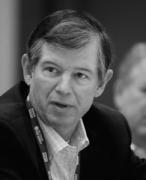The Future of Energy - As PG&E Sees It
Earley on the Cycles of Business

|
BY MARTIN ROSENBERG Editor-in-chief, EnergyBiz |
The 21st-century grid will provide utilities with a chance for growth. So says Anthony Earley, chairman, president and CEO of PG&E. He recently discussed a wide range of issues as part of an EnergyBiz roundtable with industry leaders.

ENERGYBIZ: Is the utility business model changing?

|
|
Earley: When you stay around long enough you see cycles. First it was going to be the rise of nuclear power - too cheap to meter. Then it was cogeneration. And now investments have shifted away from a number of these projects. There was merchant generation - then some of the merchants went bankrupt. The industry will change. But the basic core has got to be there for our industry. In the past, in a fairly healthy growth environment, you could do a lot of things. But if you're only growing 1 percent to 1.5 percent a year, that is a challenge. As an industry, we have to deliver really good service to our customers. We've come a long way, and we're continuing to improve our reliability. The emergence of smart meters is giving us so much information to deliver better service to our customers. Distribution automation technologies are drastically improving our ability to detect and quickly fix problems remotely. We have to transform our system to the 21st-century grid. That's our growth opportunity.
ENERGYBIZ: Where are we headed on renewables?
Earley: When I joined Pacific Gas & Electric, I wondered how would we get to 33 percent renewables. We've just crossed 22 percent, and we will get to 33 percent. New PV utility-scale solar is coming in at $70 to $80 a megawatt-hour. Just three or four years ago it was $180 a megawatt-hour. We have seen a combination of technology and incentives bring the price down. We've got to wean ourselves off the incentives. Are these technologies really going to be stand-alone competitive on their own? The other issue is integrating all these things. Dick has that challenge in spades in Hawaii, given the size of his island grids. We're starting to see that in California, but it is not insurmountable.
ENERGYBIZ: Germany has subsidized solar, and its utilities and electric customers have suffered as a result.
Earley: California is sensitive to the disaster that's gone on in Germany where their prices are going through the roof, their carbon emissions are going up and they're not accomplishing what they wanted to accomplish. In fact, both the California Public Utilities Commission and the California Energy Commission sent teams over there to look at that. We've started a discussion in California about whether we should move to a clean energy standard, not a renewable standard. The commission has become sensitive to the problems created by a blind mandate and the problems with keeping incentives at such a high level that people are making uneconomical investments.
ENERGYBIZ: What have been the lasting implications of the Metcalf substation attack?
Earley: It's pretty clear from our discussions with the FBI and others and from our own assessment that it was a planned attack. This was a very serious attack. The good news to take away from it was there were no customer outages even though Metcalf is a critical substation on our system. We're going to spend $100 million over the next four years on improving security. But the reality is that you cannot guarantee that someone is not going to be able to take out a substation. The issue is making sure that the grid is robust enough that if a substation goes down, you can restore service in a reasonable period of time. Utilities lose substations all the time in major storms, and you just have to be able then to respond to those sorts of events.
Copyright © 1996-2014 by CyberTech, Inc. All rights reserved.
To subscribe or visit go to: http://www.energycentral.com
To subscribe or visit go to: http://www.energybiz.com